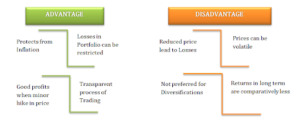Silver, cotton, crude oil, gold, and others are commodities in the real world can be traded digitally to earn profits. Such dematerialised trading of commodities is called commodity trading. Profit can be earned when the price rises and commodities are sold. It is good time to buy when prices are less to increase the unit volume. When a trader uses Forex (Foreign Exchange) pairs to buy and sell for profit it is called as Forex Commodity.
There few pros and cons that is commonly believed across the market for commodity trading. As an investor understanding the paybacks and areas of concern is important for planning the right tactics and find the best commodity tips today.
Commodity Trading Pros and Cons:
 Figure 1 Commodity Trading Pros & Cons Source: Created by Author
Figure 1 Commodity Trading Pros & Cons Source: Created by Author
As shown in the overview above the commonly observed impact is:
-
Inflation:
During inflation the stock prices tend to go down, the reverse effect happens to commodities. The price of commodities goes up due high demand. This gives more chances of profits.
-
Macro Environment Influence:
Often external factors such as war, and similar political or economic impact affects demand for commodities. Price of commodities tends to go up with opportunities of payback for an investor. Effect on Forex Commodity is often based on factors such as Consumer price index, bank rates, level of employment and others. It requires deeper analysis.
-
Higher Profits and Transparency in Transactions:
When the prices go up even substantially, investors can get high returns in commodity trading. The process is transparent as the buyer and seller prices will match and there is no manipulation.
-
Losses and Volatility:
Small changes in prices going down could lead big losses. Commodity prices are not directly influenced by demand and supply. There are various complex factors that drive prices up. Hence predictions are complicated.
-
Long Term Investments and Diversification:
During times of crisis commodity investments are not always considered wise. Past data indicates some commodities like oil & gas have not given outlets for profits. The 2008 world wide crisis is an example. Commodities are not often suggested for diversification or a preferred choice for long term growth.
Some of the important tips that you need to know when trading in commodities are:
Best Tips for Commodity Trading:
Commodity trading is usually undertaken through a commodity broker; who is an individual or an organisation facilitating buying and selling.
Here are nine guidelines that you might want to remember if you want to increase returns.
-
Stock Trading VS Commodity Trading:
When engaged in intraday trading the tactics are different for commodities and stocks. This is so because the influencers on price have a different impact on stocks as compared with commodities. Trading patterns are usually opposite for commodities and stock.
-
Approaches for Technical Analysis:
When trading on commodities the technical analysis should be carried with indicators specific to commodities. ATP or average trading price is vital; another tactic is to have double stop loss orders.
-
Diversification:
It is advised to have different kind of commodities to avoid concentrated risks and losses.
-
Tactics:
The logistics of the commodities market and the apt time frames are vital in commodities trading. When reading charts the ATP should be used. Weak commodities have to be short terms as compared with strong ones.
-
No Overtrading:
A trader should not excessively trade as it may increase chances to losses. Risk management is important and a stop loss has to be put if needed.
-
Bulls and Bears:
Commodity trader can buy when the market is turning bullish. It is time to sell when the market is bearish with stop loss on short positions.
-
Nature of Commodities:
Price trends depend on the nature of commodities; this has to be understood while trading. To illustrate gold, prices are influenced by the currency.
-
Cyclic VS Non-Cyclic:
Another good tip is to differentiate between cyclic and non-cyclic commodities. Industrial commodities that have prices going up with demand are non-cyclic and cyclic have the reverse affect.
-
Volatility:
While working with your commodity broker towards higher returns by commodity trading, it important to weigh volatility. Take stronger positions on low volatile commodity like gold.

